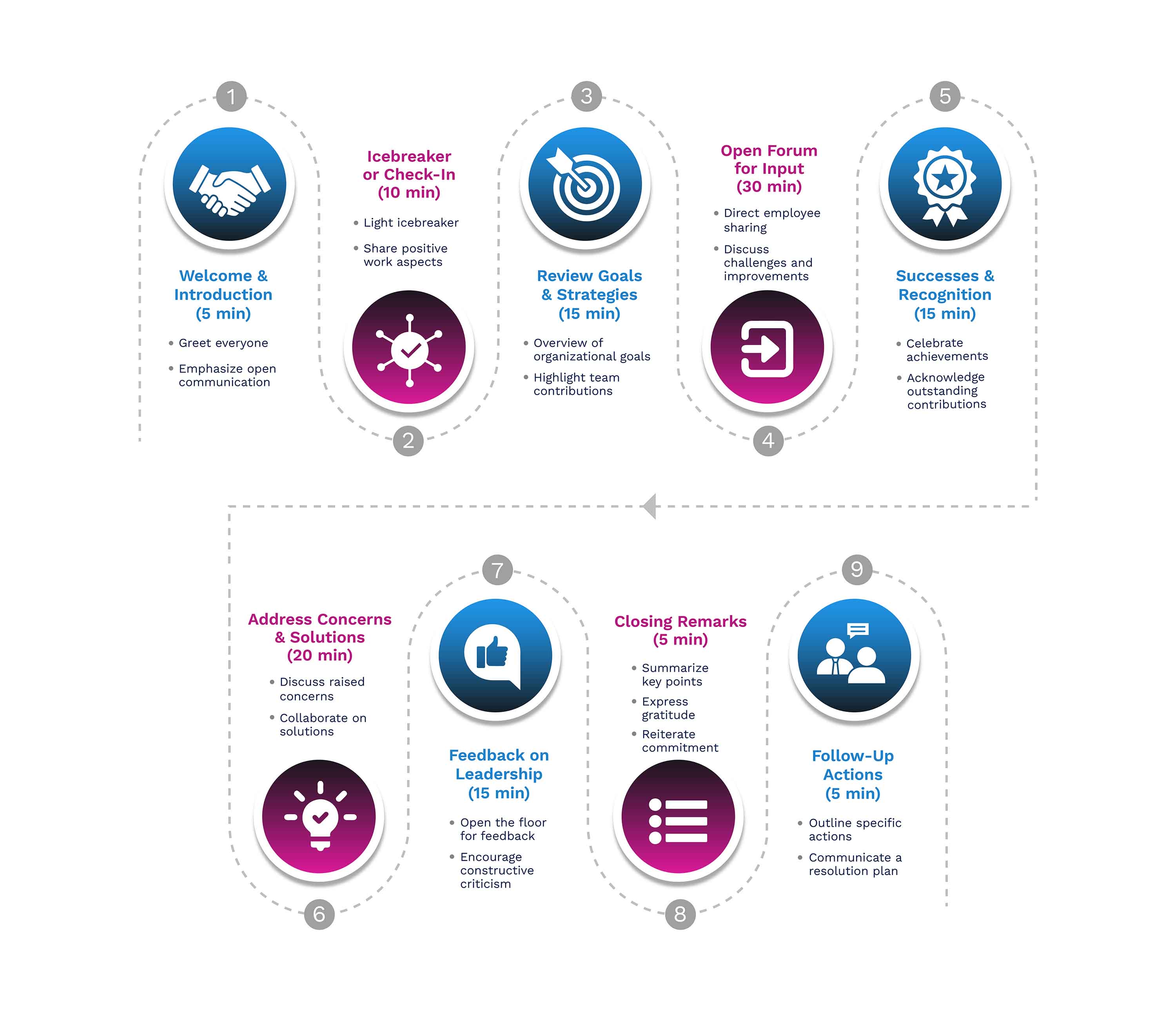Learn to foster open communication, enhance employee morale, and build cohesive teams by directly connecting with employees at all levels with skip-level meetings. Read this blog for a step-by-step guide to conducting the most efficient skip-levels.
Even with half the world conducting meetings through sleek laptop windows and phone screens, skip-level meetings are a powerful leadership practice that must be adopted regardless of your team’s location.
As leaders, you can connect directly with your team at various levels during a skip-level meet, fostering a culture of open communication and collaboration.
This approach also dramatically enhances employee morale, trust, and team cohesion, giving space to diverse perspectives.
Whether you're a seasoned executive aiming to refine your leadership style or a team member seeking to grasp the significance of skip-level meetings, this guide is tailored to meet your needs. By the end of this read, you'll be equipped with the knowledge to leverage skip-level meetings as a catalyst for positive change, elevating both your leadership skills and the overall dynamics of your organization.
What is a skip-level meeting?
A skip-level meeting is a strategic management practice where a leader or manager meets directly with employees two or more levels below the organizational hierarchy, bypassing the immediate chain of command. The term "skip-level" means the meeting skips one or more levels of management.
The primary purpose of these meetings is to promote open communication, foster transparency, and strengthen relationships within an organization. By engaging with employees at various levels, as leaders, you gain firsthand insights into the work environment, employee concerns, and the overall organizational culture. This practice can build trust, enhance employee morale, and create a sense of inclusivity.
During skip-level meetings, one often discusses various topics, including employee experiences, challenges, and perspectives on the organization's goals and strategies. These meetings allow your employees to express their thoughts directly to higher-level management without the filter of immediate supervisors.
Effective skip-level meetings require careful planning to ensure they are constructive and well-received. Leaders must strike a balance between formality and informality, encouraging open dialogue and, at the same time, maintaining a professional atmosphere.
How can you benefit from skip-level meetings?
The primary purpose of holding such meetings is to get unfiltered access to information about what's really going on in the organization.
Firstly, it helps build a connection between managers and team members who hardly interact. This interaction allows upper management to understand the daily experiences of individual contributors better. Moreover, these meetings allow managers to receive valuable feedback on their leadership and assess their performance.
These meetings are crucial because leaders sometimes lose sight of employees' daily grind efforts. And those leaders who tend to focus on big-picture ideas might need to be made aware of underlying issues. Hearing directly from frontline employees provides insights into how well the organizational structure functions. Collecting diverse perspectives is vital for overall company improvement, and that's precisely what skip-level meetings aim to achieve. Here are a few benefits of skip-level meetings:
Communicate, Communicate, Communicate:
Skip-level meetings facilitate direct communication between leaders and employees, breaking down communication barriers within the traditional hierarchy.
Happy Employees, Successful Business:
Direct interaction with higher-level leadership demonstrates that every employee's contribution is valued, leading to a positive and motivated work environment.
Trust and Transparency:
You build trust by allowing employees to communicate directly with leaders and contribute to a culture of openness where employees feel confident sharing their thoughts and concerns.
No filters:
Understanding what your team faces directly from them allows for more informed decision-making and strategic planning.
Aspirational Leadership:
Skip-level meetings allow leaders to understand the professional goals and aspirations of individual employees and give insights that can be used to tailor development plans and mentorship opportunities.
Prompt Answers:
Leaders can resolve issues more promptly by directly addressing employee concerns during skip-level meetings. This proactive approach prevents potential conflicts from escalating and contributes to a healthier workplace.
Team Spirit:
Skip-level meetings contribute to a sense of unity and shared purpose among employees. When leaders engage with team members at various levels, it reinforces the idea that everyone is working towards common goals.
Organizational Alignment:
Skip-level meetings ensure that every employee understands and is aligned with the organization's vision, mission, and strategic objectives.
Employee Empowerment:
Direct communication with leadership empowers employees to voice their opinions, share ideas, and actively participate in decision-making.
Leadership Development:
For leaders conducting skip-level meetings, the experience allows them to develop and refine their leadership skills, including active listening, empathy, and effective communication.
Skip-Level Meeting Agenda
The Skip-Level Meeting agenda outlines a structured and purposeful approach to fostering transparent communication and collaboration within an organization. The agenda emphasizes the importance of open communication.
Here is an infographic that serves as a visual guide, outlining each crucial step to ensure a productive and meaningful skip-level meeting.

What are good questions to ask in Skip-level meetings?
If you agree that skip-level meetings are the right way to improve team communication and morale, we are here to help you craft the perfect questionnaire so you know exactly what to ask. Here are some excellent questions to consider:
What to ask your employees?
- What are your career goals, and how can the organization support your professional growth?
- How do you prefer to receive feedback on your work, and are there specific areas where you seek recognition?
- How would you describe the team dynamics within your department, and do you have suggestions for improving collaboration?
- How can communication between leadership and employees be enhanced?
- What channels or formats do you find most effective for receiving essential updates?
- What challenges do you face in your role? Are there any concerns you would like to discuss?
- Are there obstacles hindering your productivity that you believe leadership should be aware of?
- How does the organization currently support your work-life balance, and do you have suggestions for improvement?
- Do you have any ideas for improving processes or introducing innovations within the team or organization?
- What initiatives or changes do you believe would positively impact the work environment?
- How well do you feel the team understands and aligns with the organization's goals and mission?
- Are there aspects of the company's vision that resonate with you?
What to ask your managers?
In seeking effective communication and mutual growth, understanding the right questions to ask your managers is crucial. Here is an additional list of questions that can help you understand your managers:
- Are there specific training opportunities or mentorship programs you are interested in?
- In your opinion, what contributes to a high-performing team, and how can we nurture those factors?
- How do you currently gather feedback from your team, and are there ways to improve this process?
- Are there employees who have demonstrated exceptional performance that may need special recognition?
- Are there areas where more transparency would benefit the team?
- Would wellness initiatives or policies enhance the overall employee experience?
- How do you encourage creativity and innovation within the team?
- Are there challenges or concerns raised by team members that need immediate attention or resolution?
- How can we proactively address potential issues before they escalate?
Overcoming Challenges in Skip-Level Meetings: Turning Disadvantages into Solutions
If you make changes without understanding the challenges that come with them, then you will likely meet resistance from various avenues. Here is a short list of issues that could surface and how to deal with them:
Time-Consuming:
People often complain, “This could have been an email.” Skip-level meetings can be time-consuming, especially for leaders with large teams or busy schedules.
Solution: Implement a structured agenda and time-management techniques to ensure efficient and focused skip-level meetings.
Resistance from Middle Management:
Working with a team means working with great, creative minds with their own quirks. With so many personalities to manage, skip-level meetings face resistance from middle managers who may feel bypassed or perceive a potential threat to their authority.
Solution: Involve middle managers in the skip-level process to address concerns and maintain open communication channels.
Limited Scope of Issues Addressed:
Skip-levels are essentially drill-downs for each team member. Pulling people out of their daily work routines puts time constraints on these meetings, which could lead to several unaddressed issues.
Solution: Prioritize the most critical issues during skip-level meetings and establish alternative channels for addressing less urgent concerns.
Unequal Attention:
There's a risk that leaders may focus more on specific individuals or teams during skip-level meetings, leading to perceived favoritism.
Solution: Establish clear guidelines for meeting interactions to ensure equal attention to all teams and individuals.
Potential for Miscommunication:
If not conducted carefully, skip-level meetings can lead to miscommunication or misinterpretation of information.
Solution: Train leaders on effective communication during skip-level meetings to avoid misunderstandings.
Implementation Challenges:
Implementing effective skip-level meetings requires careful planning and training to realize the intended benefits.
Solution: Carefully plan and communicate the purpose and benefits of skip-level meetings to address implementation challenges.
Resistance from Employees:
Some employees may feel uncomfortable expressing their opinions directly to higher-level leadership, leading to a lack of genuine feedback.
Solution: Foster a culture of open communication within the organization to reduce employee resistance and encourage honest feedback.
Risk of Information Filtering:
Sometimes, information shared during skip-level meetings may be filtered or altered before reaching higher management, affecting the accuracy of insights gained.
Solution: Implement measures to monitor and ensure the accurate flow of information from skip-level meetings to higher management.
Elevate your next skip-level meeting with Exela HR Solutions
Master skip-level meetings with Exela HR Solutions for a transformative leadership experience. Whether you're a seasoned executive or a team member, our tailored insights empower you to navigate skip-level interactions confidently. Elevate your leadership skills, foster transparent communication, and cultivate a culture of openness.
Our expertise ensures that your meetings catalyze positive change within your organization. The future of effective leadership and engaged teams begins here.
Get Exela HR Solutions now!
DISCLAIMER: The information on this site is for general information purposes only and is not intended to serve as legal advice. Laws governing the subject matter may change quickly, and Exela cannot guarantee that all the information on this site is current or correct. Should you have specific legal questions about any of the information on this site, you should consult with a licensed attorney in your area.
